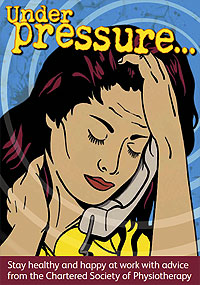 |
 |
|
UK office workers are putting their mental and physical health at risk by working more than two hours extra each night on their commute and at home, a new survey for the Chartered Society of Physiotherapy (CSP) reveals.
The main reasons cited for doing extra work were to 'ease the pressure of the working day' (35 per cent) and 'too much work to do' (33 per cent). While 29 per cent of people surveyed said additional work at home helped reduce their overall stress levels, a worrying 24 per cent want their boss to offer counselling services for stress. The survey revealed 53 per cent of those who work at home out of office hours said this had increased in the past two years, but of these people just 8 per cent said their boss was trying to do anything about it. Physiotherapists are concerned that 'over working' is storing up both physical and mental health problems for the future - particularly since 66 per cent of those surveyed reported suffering job-related ill health such as headaches and back pain. The CSP is concerned that poor posture when using smartphones and other mobile devices - which many people do their additional work on - can lead to back and neck pain. Fewer than one in four people told the survey that they considered their posture when looking at screens outside of work. Long hours can also contribute to stress-related illness.
On Workout at Work Day about 300 physiotherapists will go into workplaces across the UK to demonstrate easy, low-cost ways for employers to help their staff lead healthier lives. The CSP hopes employers will be more aware of the need to keep their staff healthy, and will use Workout at Work Day to encourage better working habits among staff. Simple low cost measures include: * Encouraging staff to report any concerns about their health at an early stage * Encouraging staff to take regular breaks and be physically active during lunchtimes * Displaying leaflets and posters promoting good posture, health advice and activities for staff * Arranging and supporting activities that help staff to get active, like lunchtime walking clubs * Creating links with local gyms and clubs * Implementing a Cycle to Work scheme and taking advantage of a tax exemption enabling you to loan to staff cycles and cycling equipment as a tax-free benefit * Encouraging active travel to and from work e.g. cycling, walking and running * Encouraging workstation assessments to reduce and treat musculoskeletal disorders. Access to physiotherapy, fitness classes and ergonomically-designed chairs were three services that many workers in the survey said they would like their employer to pay for.
"The results of this survey are a huge concern to physiotherapists, who see the consequences of poor posture and bad working practices each day. The CSP has produced a new free leaflet in association with the Chartered Institute of Personnel and Development (CIPD) called 'Under Pressure'. This looks at the link between physical activity and mental wellbeing, with advice on staying happy and healthy at work. Ben Willmott, CIPD's head of public policy, said: "Employers should be concerned if staff are regularly taking work home with them and finding it hard to switch off and re-charge. While a level of pressure is of course an essential part of working life, evidence suggests that prolonged exposure to excessive pressure - i.e. stress - is linked to conditions such as anxiety, depression and heart disease. Managers should be asking staff regularly about their workload to ensure people's health does not suffer. You can download advice booklet 'Under Pressure from the E-Library database. Use search word 'pressure' Source: Chartered Society of Physiotherapy / Ivan Timson |
|
|


 Dr Helena Johnson, chair of the Chartered Society of Physiotherapy, said:
Dr Helena Johnson, chair of the Chartered Society of Physiotherapy, said: